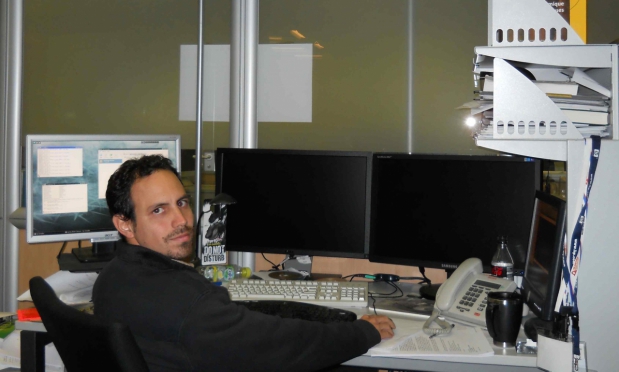
 The theatrical work Los enemigos del pueblo (The Enemies of the People), whose presentation at the independent El Círculo State Security forces sought to prevent, undoubtedly marks a watershed in the career of actress Lynn Cruz. At that time she decided to create, with her partner the filmmaker Miguel Coyula, art in a totally independent and political way.
The theatrical work Los enemigos del pueblo (The Enemies of the People), whose presentation at the independent El Círculo State Security forces sought to prevent, undoubtedly marks a watershed in the career of actress Lynn Cruz. At that time she decided to create, with her partner the filmmaker Miguel Coyula, art in a totally independent and political way.
Lynn Cruz boasts an extensive career. Since 2003 she has worked in several Cuban theater groups, and had an enriching experience in German theater, in 2009. She won the David Suárez Award for Best Actress in Venezuela, and the Cayenne Short Film Festival Award in New York, in 2016, both for her leading role in the short film El niño (The Boy). She was nominated for Best Actress at the Los Angeles Film Festival in 2015 for the short film Finales, produced in Ecuador. She has formed part of the cast of Cuban films like La Pared (The Wall), Larga Distancia (Long Distance), ¿Eres tu, papá? (Is That You, Dad?) and the documentary (Nadie) No one, by Coyula, censored in Cuba and honored at the 10th Film Festival of the Dominican Republic, in 2017. continue reading
DIARIO DE CUBA talked to her about her beginnings and her constant search for freedom in her professional career.
“In my adolescence I did not have a defined vocation, nor did I know what to do with my life. Since I didn’t want to end up without a university degree, I chose to study for a degree in Geography, which was one of the easiest majors. On that path I discovered that what I really liked was acting,” she explained.
“I ventured into amateur theater groups in Matanzas, where I lived, but I couldn’t make my way there. In the year 2000 I moved to Havana, where I was able to enter a professional group called the Teatro del Puerto. I was there for a year. Then I worked in other theater groups, until in 2009 I traveled to Germany to work with the independent group Pig’s Appeal in that country.”
What was the experience of doing theater in Germany like?
Before that Colombia was the only other country I knew, and it was the first time I was in a developed country. That really affected me as an artist. I started to question my identity, because I worked with German playwrights and actors. I also had to deal with a text openly critical of the Cuban reality, by Carlos A. Aguilera, and my reticence to perform it. That did not mean that I was in agreement with the Cuban political system, because I have always been very rebellious, but until then I identified more with the institutions than with what was outside of them.
The experience of doing theater in Germany was so intense, from every point of view, that it totally changed me. From that moment on, I lost the motivation to work for institutions. Before my trip I had achieved the dream of every actor, which is to play a leading role in a film, in Larga Distancia (Long Distance), directed by Esteban Insausti. But in the end I felt that my life was the same, that nothing had changed. It was then that I begin to think about forming my own theatrical group, independently.
How did you manage to put together the work El Regreso (The Return), which marked the birth of the Kairós Theater in 2011?
The work La Indiana, by the Catalonian Angels Aymar, in which the Catalonian presence in the 19th century is portrayed, and the nostalgia with which those indianos (Spanish emigrants) wrote their letters, speaking of their native land, spurred me to draw a parallel with Cubans who have left and their nostalgia for a lost land. I managed to get the Spanish Agency for International Cooperation to support me financially with its staging. However, the money was not much, and we had to reduce the number of actors, from six, originally, to one.
Then came the opposition by the president of the National Council of Performing Arts, Gisela González, to the work to being presented at the Adolfo Llauradó Theater. But I was determined to stage the work, even if it was in a park. In response to that meddling, the Spanish Embassy secured a space at the Las Carolinas (theater), in Old Havana, but the technicians wanted a bonus to stage it.
This kind of payment is a standard practice when they see you’ve got foreign financing. If you don’t pay it, you pay the price I did: they sabotaged the show. It was a horrible experience because the audience came in ahead of time, because there were no doormen, among other very unpleasant incidents. For practical reasons I could not continue at the Teatro Kairós at that time. I had no money to support it, and I accepted other offers to work in cinema.
How did the play Los enemigos del pueblo (The Enemies of the People) come about. Was it your return to an openly critical and practically “solo“ theater?
The theater director Adonis Milan found out that I had shouted “¡Viva Cuba libre!” at a show where that was not in the script. He told me that he wanted to work with me, and he showed me Charlotte Corday, by Nara Mansur.
When I saw that work, so timid, I felt that I couldn’t do it. “Cuban theatre cannot continue to bite its tongue. It must make a commitment to the era in which we live.” I expressed to him that I would rewrite the text to see how it turned out, and so was born The Enemies of the People, where the main reason why Charlotte Corday [who murdered Jean-Paul Marat during the French Revolution] wants to kill Fidel Castro is because the crime of the March 13 Tugboat has gone unpunished.
And, as the cause of Castro’s death was never announced, I thought I could invent a murderer and, more than Charlotte Corday, it is history that does justice.
I feel like this work was not my choice, but that it chose me, because of the emotional impact I felt when I saw the images and accounts of the survivors of that crime.
Although I had second thoughts, because of the consequences it could mean for me, I felt it was my duty to do it. From that moment on, the feeling of freedom that I have felt makes up for possible losses.
What projects are you currently working on?
For some time now I’ve been writing a series of monologues that I have titled Patriotism 3.677, inspired by the anthology Spoon Rivers, by the American poet Edgar Lee Masters. This work is a discussion about the political situation and the future of Cuba, in which five people talk about freedom, democracy and change.
The Kairós Theatre is shaping up and wants to do political theater, in which the tyranny under which we live is directly criticized. It is a theater of resistance because, as everyone knows, all the other theaters belong to the Government. We have managed to perform The Enemies of the People six more times at private homes. Each stage, because it is different, makes every show unique.
I have also been working for the last six years as an actress, co-writer and producer on the science fiction feature film Corazón Azul, by Miguel Coyula. Shooting this film is like travelling, in terms of time and intensity. Working with Coyula, due to how long it takes to complete his films, becomes a life experience. He is a director who works in an artisanal way, and we were brought together by my conception of theater, with a small team, and independently.
This is related to the part behind the cameras. As an actress I like stylized cinema and, since there is not much of it in Cuba, where more realistic films are made, working with him is a real treat.
In Corazón Azul I play Helena, a mysterious woman who has been part of a genetic experiment carried out by Fidel Castro to create the new man. She is a kind of Helen of Troy, and triggers the main conflict in the movie. We have completed 50 minutes, adjusting to the actors’ time, as the budget does not allow for a traditional production.
Note: This translation is from Diario de Cuba’s English site

